Igor Sechin makes a keynote speech at the Energy Panel
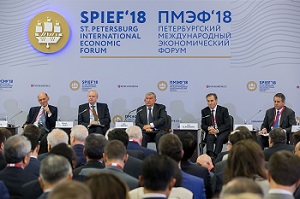
Igor Sechin, Chief Executive Officer of Rosneft, delivered a keynote speech at the Energy Panel held during the XXII St. Petersburg International Economic Forum.
The event was attended by the Russian Energy Minister Alexander Novak and the head of OPEC Mohammed Barkindo, as well as the leaders of the world's leading companies in the industry, including: Chief Executive Officer of BP Robert Dudley, Chief Executive Officer of Eni Claudio Descalci, President of ExxonMobil Production Company Neil Duffin, Head of Glencore Ivan Glasenberg, General Director of Total Patrick Pouyanne, President and CEO of Baker Hughes Lorenzo Simonelli, Head of Vitol Ian Taylor, Chairman of Essar Oil Board of Directors Tony Fountain, as well as representatives of Trafigura, Gunvor, Marubeni, Mitsui, PetroChina, Hyundai, Siemens and several other companies. Nobuo Tanaka, Executive Director of the International Energy Agency in 2007-2011 was the moderator of the event.
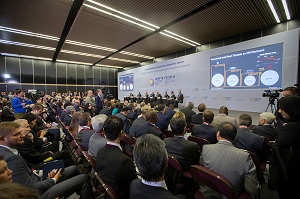 In his report, Igor Sechin made the main focus on the consideration of risks and new opportunities in the oil markets. Speaking about the future of energy, the head of Rosneft expressed confidence in the steady growth of demand for oil and gas in the long term. "Forecasts of leading analysts and companies, including the recently published BP's global energy development forecast are saying that even in the most challenging scenarios the demand for hydrocarbons by 2040 will be higher than today", Sechin said, noting that oil and gas will remain the core of the world energy and economy in the foreseeable future. "This is the consensus position of the key market players, and Rosneft shares it completely," he added.
In his report, Igor Sechin made the main focus on the consideration of risks and new opportunities in the oil markets. Speaking about the future of energy, the head of Rosneft expressed confidence in the steady growth of demand for oil and gas in the long term. "Forecasts of leading analysts and companies, including the recently published BP's global energy development forecast are saying that even in the most challenging scenarios the demand for hydrocarbons by 2040 will be higher than today", Sechin said, noting that oil and gas will remain the core of the world energy and economy in the foreseeable future. "This is the consensus position of the key market players, and Rosneft shares it completely," he added.
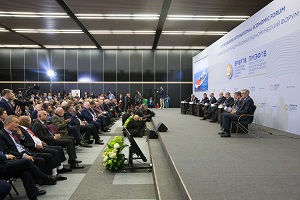 According to Rosneft CEO, the global economy still preserves strong oil consumption growth sectors, i.e. aviation, water transport, road freight transport, as well as petrochemicals. The latter is expected to make a major contribution to the increase in global demand for petroleum products. "We do not see any real threats to the development of the oil market on behalf of demand," Sechin said.
According to Rosneft CEO, the global economy still preserves strong oil consumption growth sectors, i.e. aviation, water transport, road freight transport, as well as petrochemicals. The latter is expected to make a major contribution to the increase in global demand for petroleum products. "We do not see any real threats to the development of the oil market on behalf of demand," Sechin said.
"It is a fact that the instruments of the "financial war" have spread to the real sector; at the same time, such actions, in the opinion of their irresponsible initiators, do not need any arguments for their justification", Sechin said, noting that in the recent years, the United States have consistently pursued a policy of non-acceptance of treaties that would allow challenging their actions on the international platforms. "In fact, judicial defense and fair market arbitrage are ruled out", the head of Rosneft said.
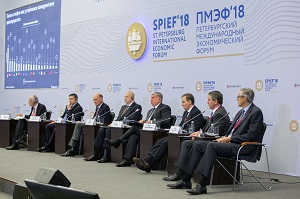 According to Sechin, the influence of political decisions on the world economy has increased many times. "The total volume of hydrocarbons unilaterally limited for development is about one third of the world oil reserves (Iran, Venezuela and Russian oil and gas companies). This is a unique negative record – it has never happened before in the history of the global market", Sechin pointed out.
According to Sechin, the influence of political decisions on the world economy has increased many times. "The total volume of hydrocarbons unilaterally limited for development is about one third of the world oil reserves (Iran, Venezuela and Russian oil and gas companies). This is a unique negative record – it has never happened before in the history of the global market", Sechin pointed out.
The analysts rightfully speak about the "shock waves" of sanctions which blasted on the commodity markets - i.e. market of metals, power resources, and food commodities. The unproductive sanction approach is repeated "as a carbon copy" even at the level of individual regions, as can be seen from the example of Qatar economic blockade.
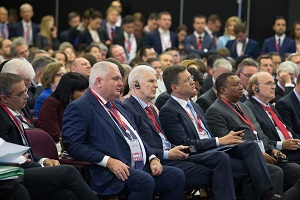 Sechin believes that the policy of sanctions and ultimatums for the hydrocarbon markets cause permanent sanctions premium to the price. "After some time, I suppose, we can talk about the sanctioned feedstock "super cycle" and we will see new price records soon", Rosneft CEO said.
Sechin believes that the policy of sanctions and ultimatums for the hydrocarbon markets cause permanent sanctions premium to the price. "After some time, I suppose, we can talk about the sanctioned feedstock "super cycle" and we will see new price records soon", Rosneft CEO said.
According to him, the new price level, which will be ultimately paid for by the customer, will be reached not following the OPEC+ work or other agreements but by the implemented unilateral sanctions policy. In this regard, Sechin recalled the data presented in the report of the Kiel World Economy Institute for 2017, according to which 40% of losses from sanctions imposed on Russia fell on Germany and only 0.6% on the USA.
The head of Rosneft also pointed out the effect of currency component, inflation and interest rate in the oil price. "Many of these factors are also under the control of US regulators being tools for creating a competitive advantage for their own producers", Sechin said. - If we take into account the contribution of inflation and the weakening of the dollar, the current level of oil prices in the price level of 2000-s is less than 45 dollars per barrel."
Igor Sechin reminded that a number of producers, first of all American shale companies, need the high cost of oil. "An important incentive is also a tax reform in the USA – he said – which contributed to the industry investments by improving the shale projects economy." At the same time, the head of Rosneft pointed out a number of serious problems that shale companies face. These are infrastructure constraints, shortage of service companies and qualified personnel, increased water cuts, gradual depletion of reserves in the most profitable areas (sweet spots), problems with utilization of associated gas and other environmental risks. According to Sechin, "the growth of shale oil production will continue, but it is already obvious that it has its limitations in scope and duration and requires constant development of the technology."
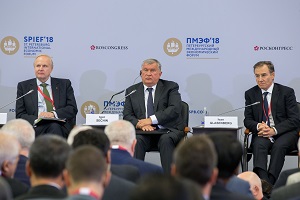 In the current conditions of increasing uncertainty, the responsible behavior of market players can become the key to sustainable development of the industry. "Now the time has come to make a transition the new stage of interaction among the exporting countries (and possibly a wider community), which should be more flexible, adaptive to the dynamics and long term market demands. It seems that we need to think about the development of a suitable site for such work," Sechin said. "There is an important aspect of merely practical work which is important in the current chaos of markets," he added. - Increasing uncertainty at all stages of investment and operational activities puts forward the task to develop regional service & engineering hubs."
In the current conditions of increasing uncertainty, the responsible behavior of market players can become the key to sustainable development of the industry. "Now the time has come to make a transition the new stage of interaction among the exporting countries (and possibly a wider community), which should be more flexible, adaptive to the dynamics and long term market demands. It seems that we need to think about the development of a suitable site for such work," Sechin said. "There is an important aspect of merely practical work which is important in the current chaos of markets," he added. - Increasing uncertainty at all stages of investment and operational activities puts forward the task to develop regional service & engineering hubs."
According to Sechin, the development of exchange trade, including the one in national currencies, also plays an important role in increasing the transparency and stability of the market. Interest in the oil futures trading in yuan at the Shanghai International Energy Exchange has already been shown by international investors – the first deals were concluded by major traders Glencore and Trafigura. St. Petersburg International Commodity Exchange (SPMMEX) is actively working in the same direction, with the support of all leading Russian companies, the head of Rosneft said.
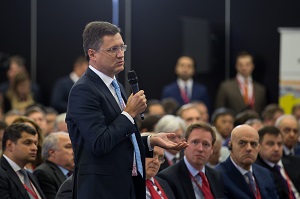 Sechin stressed that the prospects for the development of electric vehicles are not a risk factor for the oil market in the foreseeable future. "The large-scale production of low-budget electric vehicles Tesla-3 claimed by Tesla has not taken place so far," said the head of Rosneft. As a result, the investors have become less enthusiastic about the company's prospects." We make substantial investments to the associated and natural gas utilization and flares liquidation - about USD 2 bln for the last 5 years which is comparable with the "green energy" efforts from the largest companies of the sector," Sechin said. - As a result, we consistently reduce the amount of greenhouse gas emissions. We believe this is a more effective and important contribution to the issues of the climate agenda."
Sechin stressed that the prospects for the development of electric vehicles are not a risk factor for the oil market in the foreseeable future. "The large-scale production of low-budget electric vehicles Tesla-3 claimed by Tesla has not taken place so far," said the head of Rosneft. As a result, the investors have become less enthusiastic about the company's prospects." We make substantial investments to the associated and natural gas utilization and flares liquidation - about USD 2 bln for the last 5 years which is comparable with the "green energy" efforts from the largest companies of the sector," Sechin said. - As a result, we consistently reduce the amount of greenhouse gas emissions. We believe this is a more effective and important contribution to the issues of the climate agenda."
An important task of the global energy industry is to increase its level of investment attractiveness. "We see numerous examples of reduction of the fiscal burden on oil and gas companies in different countries of the world, which helps them to fully unlock their resource and investment potential thereby driving the long term economy growth. Fiscal tool are harmonically added by the monetary policy tools - active financing, interest incentives for export financing, reduction of the national currency exchange rate for the establishment of competitive advantage", Sechin said.
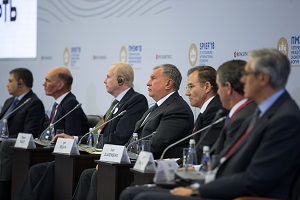 However in Russia, according to him, there is a certain fiscal imbalance in approaches to taxation of the oil industry. Imbalances in the fiscal regulation of the refining segment has led to the fact that, for example, EBITDA of the whole Rosneft's Downstream – a company with a dominant share in the domestic oil products market and 13 large refineries in Russia, with more than a trillion rubles invested in modernization – does not exceed 7% of the consolidated EBITDA of the whole company group in today's macro conditions, Sechin said. "We need to find sustainable solutions that, given the growth in world oil prices and the receipt of additional revenues by the budget, will create normal incentives for the development of oil refining and petrochemicals. We have started to review such approaches with the Government of the Russian Federation."
However in Russia, according to him, there is a certain fiscal imbalance in approaches to taxation of the oil industry. Imbalances in the fiscal regulation of the refining segment has led to the fact that, for example, EBITDA of the whole Rosneft's Downstream – a company with a dominant share in the domestic oil products market and 13 large refineries in Russia, with more than a trillion rubles invested in modernization – does not exceed 7% of the consolidated EBITDA of the whole company group in today's macro conditions, Sechin said. "We need to find sustainable solutions that, given the growth in world oil prices and the receipt of additional revenues by the budget, will create normal incentives for the development of oil refining and petrochemicals. We have started to review such approaches with the Government of the Russian Federation."
"Let me come into line with what was said in the report of Igor Sechin when he mentioned on the tax legislation issue," Energy Minister Alexander Novak said in his speech at the Energy Panel. "A stable and understandable tax policy is an important element from the point of view of the business and investment in long-term and capital-intensive projects in the oil and gas industry."
Speaking about the Company's development strategy, Sechin noted that Rosneft is striving to constantly improve its efficiency. "It includes technological re-equipment, organizational innovations, and reaching a new frontier in cooperation with the industry partners based on mutual respect and consideration of common interests," head of Rosneft said.
"We share an opinion with our colleagues that in the new reality of permanently growing competition, efficiency leaders have the best chances for success and robust development, including those in Upstream capable of ensuring minimum costs. Rosneft has the best performance among competitors in this respect, and we intend not only to retain it but also improve by 2-3% p.a. in comparable conditions", Sechin said.
According to him, by 2022 the Company is going to ensure at least 2% annual production growth, particularly due to geological and technical measures at brownfields, including the Samotlor field, as well as active development of a number of new promising projects (incl. Vankor cluster, Erginskiy cluster, Russkoe and Severo-Komsomolskoe fields). "A set of technological innovations shall enable an increase in challenged reserves production, as well as general optimization of the field development system onshore the Russian Federation", Rosneft CEO remarked.
The development of technological potential is one of the key elements of the Rosneft-2022 strategy. The company pays special attention to innovations and the use of breakthrough modern approaches defining technological leadership as the key factor of competitiveness in the oil market.
The implementation of new technologies is also aimed at increasing the efficiency of the company's activities in ecology, industrial safety and environment protection. Rosneft has committed to enter the first quartile of the world oil and gas companies by 2022 in terms of the key indicators in this area," Sechin said.
The head of Rosneft finds that unconditional fulfillment of obligations is the basis of the global economic order, market economy and international energy security. According to him, mutual investments, swap of assets, business integration, and search for mutually beneficial solutions for the market contribute to the confidence promotion. "Rosneft remains a reliable partner which is open for cooperation in these complicated and unpredictable conditions. We will continue to attract partners and implement joint integrated projects. In other words, we shall remain in the forefront of the energy security being a true industry leader – this is our responsibility," Igor Sechin concluded.
PRESENTATION OF I.I. SECHIN ON THE ENERGY SECTION
PRESENTATION. OIL INDUSTRY: ON THE VERGE OF NEW RISKS OR NEW OPPORTUNITIES?